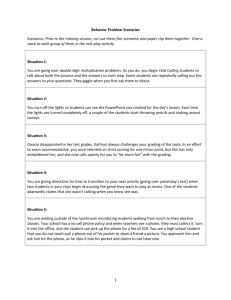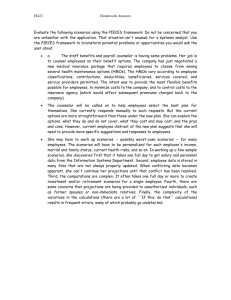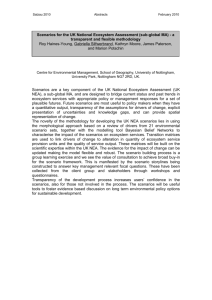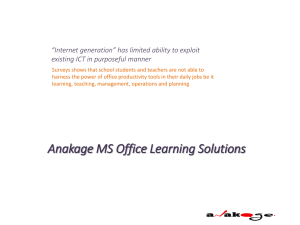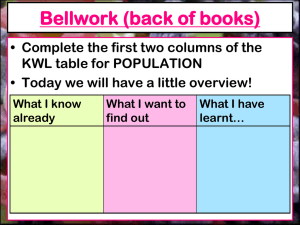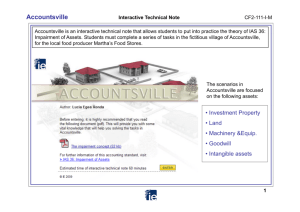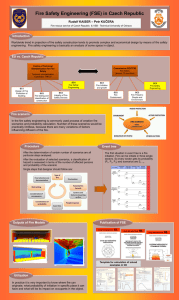Food and beverages scenarios
advertisement
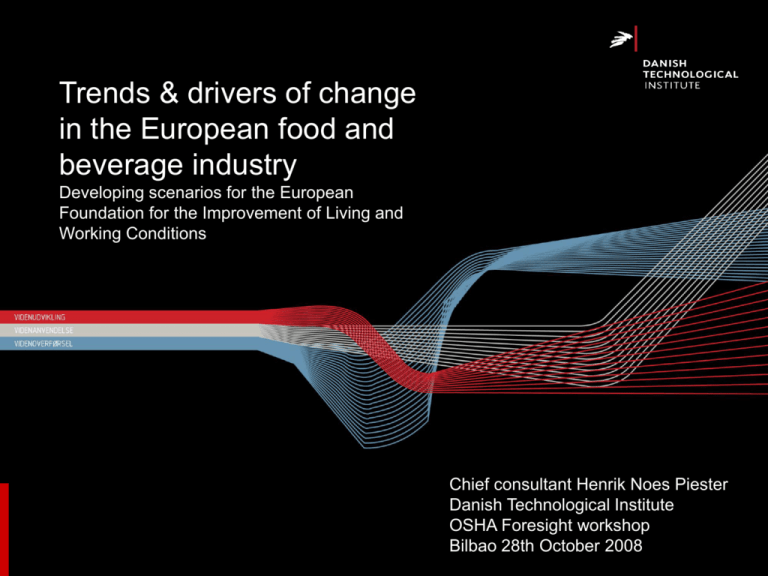
Trends & drivers of change in the European food and beverage industry Developing scenarios for the European Foundation for the Improvement of Living and Working Conditions Chief consultant Henrik Noes Piester Danish Technological Institute OSHA Foresight workshop Bilbao 28th October 2008 Agenda 1 3 Method: A trendbased approach to developing scenarios Example: Scenarios for the European food and beverage industry Strengths and Weaknesses 4 Conclusions 5 Questions 2 Scenarios Scenarios = alternative futures. Not looking into a crystal ball but platforms for reflection “Stories of the inevitable and necessary recombined with the unpredictable and matters of choice” (Ulrich Golüke) Many approaches to developing scenarios Scenarios describes the context in which the actor is situated Backcasting and forecasting Image B IMAGE OF THE FUTURE A portrait of the state of affairs at a given point in time Now Where are we, what should we do... Histories Image A FUTURE HISTORY Description of a future course of events, often highlighting key events, decisions, or turning points © Ian Miles, PREST Image C The backbone of scenarios - drivers Different scenarios are created on the basis of drivers that are at the same time the most important, yet uncertain factors that influence the topic of the scenario exercise For instance: demography vs. consumer trends Often two drivers to keep things simple – sometimes 2+ drivers to get more input to the development of scenarios Scenario development involves many choices (eg. selection of drivers) that may be questioned by the audience Developing scenarios – a trend based approach Data collection – desk research, statistical data and interviews Analysing trends and identifying drivers of change Developing the scenarios Identifying implications and future challenges Scenarios for the European food and beverage industry Developed for the European Foundation for the Improvement of Living and Working Conditions (Eurofound), Dublin DTI has carried out a range of sector studies for Eurofound incl. Textiles and clothing sector, Commerce sector, Biomedical sector, Transport and logistics Study on the European Food and Beverage Industry was carried out in 2005-2006 Trends and drivers of change Global migration European enlargement and the single market Global supply of skills Liberalisation of international trade Cost level in nonEuropean ccountries Technological innovation European Food and Beverage Industry Emergence of foreign competitors Changing demographics in Europe New lifestyles and consumer trends New standards and regulation Economic growth rates Government and industry initiatives 8 5 drivers for the development of the food industry 1 2 3 4 5 The development of the World economy Positive or negative? Consumer demand for niche products High or low? Product and process innovation in the High or low innovation rate? sector Globalisation of production and trade in the WTO agreements or sector regional bi-lateral trade? Government involvement in the promotion Many or few initiatives? of healthy food habits Number of scenarios: 2*2*2*2*2 = 32 We choose three scenarios that were plausible, consistent and interesting The Three Scenarios ”Rock Your Body” ”Stayin’ Alive” ”We are the World” The three scenarios “Rock Your Body” “Stayin’ Alive” “We are the World” The development of the World economy Consumer demand for high value-added products Product and process innovation in the sector Globalisation of production and trade Public support for healthy food habits Regional/bilateral Little involvement Active involvement Active involvement Implications Overall situation of the sector Innovation Business strategy Value chain and location Employment and skills needs Main challenge for companies Weaknesses Storytelling without substance? ”The preferred Darling” or ”Devil in disguise” Focus on existing trends and drivers of change may result in very conservative scenarios Developing ’good’ scenarios require in-depth knowledge of issue area and understanding of the policy context Difficult to connect the macro, meso and micro levels Emerging trends and knowing what we do not know (yet). The role of “wild cards” (ecological collapse in China, terrorist attacks etc.) Strengths Structure and challenge existing world views on the basis of a holistic understanding Adds a creative dimension to strategy and policy development Focus strategic dialogue among stakeholders and help create consensus Awareness of potential future challenges – scenarios constitute an ’early warning system’ Strategic outlook – opportunity to ask the ’What If’ question Conclusions Not rocket science… A tool for structured and creative thinking about the future and as a catalyst for strategic conversations and discussions, but not as an end in itself. Challenges: Method may be challenged by participants, requires in-depth knowledge of issue area, and scenarios takes time… Questions? Thank you! More information: Eurofound sector studies: http://www.eurofound.europa.eu/emcc/indexes/emcc_dossier.htm Danish Technological Institute: www.teknologisk.dk Please contact Chief consultant Henrik Noes Piester Email: henrik.noes.piester@teknologisk.dk Tel: +45 7220 2678
